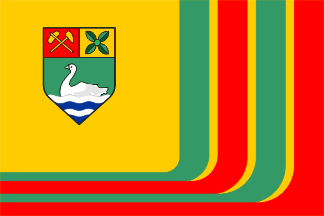 image by Martin Grieve, 18 July 2005
image by Martin Grieve, 18 July 2005
Last modified: 2015-07-25 by bruce berry
Keywords: roodepoort |
Links: FOTW homepage |
search |
disclaimer and copyright |
write us |
mirrors
 image by Martin Grieve, 18 July 2005
image by Martin Grieve, 18 July 2005
Roodepoort is located to the west of Johannesburg and is part of the Witwatersrand conurbation (known colloquially as the West Rand). The town owes its origin to the discovery of gold and although the diggings were not as profitable as elsewhere on the Witwatersrand, Roodepoort was established as a municipality in 1903 and became a city in 1977. Following the re-organisation of local government in South Africa in 1994, Roodepoort is no longer a separate municipality and in December 2000 became part of the Greater Johannesburg Metropolitan Municipality.
The flag of Roodepoort, adopted during its Diamond Jubilee celebrations in 1963, was in the predominant colours of its municipal arms and had the shield in the canton. The remainder of the flag comprised four alternating “L” shaped bands in the fly of green and red fimbriated in yellow in the fly and uniting without the fimbriation at the bottom of the flag.
gt-rd.jpg) scan by
Bruce Berry, 24 Sept 2006
scan by
Bruce Berry, 24 Sept 2006
The blazon of the arms granted to Roodepoort by the Administrator of the Transvaal on 01 July 1964 and subsequently registered by the South African Bureau of Heraldry on 20 February 1968 is as follows:
ARMS: Vert, a
swan Argent swimming on a base wavy Argent and two bars wavy Azure; on a
chief per pale, I. Gules, two gold mining hammers crossed in saltire; II. Or, a
quatrefoil Vert
CREST: A mural crown Or, masoned Sable
WREATH AND MANTLING: Or and Vert
SUPPORTERS: On a grassy mount Vert, dexter a blesbok; sinister a springbok, both
proper
MOTTO: QUATTUOR IN UNO (Four in One).
Several local school submitted designs in response to a competition organised by the municipality and these were submitted to a heraldic authority, Mr Mitford-Barberton, in Cape Town. None of these designs were considered heraldically correct and accordingly Mr Mitford-Barberton was commissioned to design a flag, which was taken into use in October 1963.
The crossed mining hammers symbolise the contribution of the gold mining industry to the growth of the town while the four leafed clover represents the four mining towns (Maraisburg, Hamberg, Florida and Roodepoort) which merged to become one city. The swan is a reminder of the gift of twelve swans from the Royal Swannery in Cookham-on-Thames presented to the municipality by King George V after his visit to the town in 1936.
These municipal symbols are no longer
in use following the incorporation of Roodepoort into the
Greater Johannesburg Metropolitan Municipality.
Bruce Berry, 20 Sept 2006